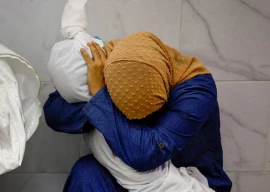
KARACHI: Independent analysts, political observers and government officials believe that there are political motives behind the violence in Karachi insofar as every political party or group wants to gain control of an area. Their show of strength ultimately results in bloodshed.
Differences between the former coalition partners, Pakistan Peoples Party (PPP) and Muttahida Qaumi Movement (MQM), over the share of power in the government is a major reason for the violence in the city. But the involvement of land, drug and weapons mafia cannot be ruled out.
“Whenever differences emerge between both partners, violence erupts in Karachi,” said Ali Hassan of the Sindh Unity Forum. “It is political pressure on the government by the MQM that the affairs of the province cannot be run without its help.”
The MQM parted ways with the government seven times. Each time the parties developed differences, a law and order situation was created in Karachi. “Whenever these estranged coalition partners sit and negotiate with each other, the situation returns to normalcy,” he said, adding that each time the Muttahida “compelled” the government to accept its demands, whether it was an issue of the local government system or the restoration of Hyderabad and Karachi to their old status, the situation in the city changed accordingly.
He quoted a statement made by the Additional IG. “Saud Mirza has handed over a list of people involved in the violence, but the government is not willing to take action due to their reconciliation policy,” Hassan said.
The leaders of the MQM blatantly reject this theory. They said that they had nothing to do with the violence and their’s was a peace-loving party. According to them, the drug and the land mafia are involved in the killings. “More than 60 people have been killed by drug peddlers who have no affiliation with any party,” said Wasim Aftab, a member of the MQM’s central decision-making body, the Rabita Committee.
When his attention was drawn to ethnic violence in the city he said, “We also want to ask the government why the ethnic cleansing of Urdu-speaking people started?” He said that terrorists killed innocent people after identifying them by their ethnic background. There have been no differences between the political parties in the recent past. This is conspiracy against them, said Aftab. “We have asked the government to take action against criminals in the ranks of political parties. We will not resist action if the government finds criminals and land grabbers within our party,” he declared.
However, Zohra Yousuf, the chairperson of the Human Rights Commission of Pakistan, said that the political parties were involved in violence. According to her too, most of the murders were politically motivated. “We have conducted research revealing how parties patronise their groups involved in land grabbing and violence,” she said. More than 300 people have lost their lives in July alone, which was the deadliest month of the year, she added.
A criminologist, Prof. Dr Fateh M Burfat, said, “Not just one group or a party is involved in drug, land, extortion and smuggling, but all political parties are involved in this menace,” he said while talking to The Express Tribune. “These activities become the sources of income for the parties and their workers,” he said. A “tug of war” has been created between the groups and political activists attack each other while guarding their areas.
Burfat said that the weapons used to be smuggled through trucks but now they are brought in by the sea where the government does not seem to keep a eye. He rejected the government’s claim that a conspiracy was being hatched against the state. He regarded the theory as “old”. “It is a war of influence in the city,” he said. The factors are political, ethnic and sectarian, but politics dominates the rest. The Pakhtun seem to be an emerging force in Karachi, which does not suit the MQM and some other forces in Karachi, who claim to be the real representatives of the city and this leads to ethnic violence. “Around 250 people have been killed on ethnic grounds,” he added.
Regarding the role of intelligence agencies, Burfat said that their priority has shifted to fighting terrorism, hence they have nothing to do with the recent spate of violence in Karachi. “These agencies have played a role in establishing political parties, sectarian groups and even a few Sindhi nationalist groups to create situations for linguistic riots,” he said. “Now these groups work independently without any support.”
Ahmed Chinoy, the chief of the Citizens-Police Liaison Committee, also said that land grabbers, drug mafia and weapon smugglers created violence to divert the government’s attention so they can continue their work. “The government’s hands are full dealing with the violence, and these elements flourish by smuggling weapons and occupying lands,” he said. There is a need for an effective policy to maintain the law and order situation in Karachi, he added.
A senior police official told The Express Tribune that criminals belonging to political, religious and nationalist parties have been operating in different areas as “warlords” who supervise the extortion and land grabbing in their areas.
“Activists of Sindhi nationalist parties, the Sunni Tahreek, MQM, ANP and Peoples Amn Committee are involved in this menace, but wherever the police arrest these criminals senior officials issue directives to release them,” he said. “I assure you that the police can give a fruitful result if it is given a free hand and resources.”
But according to Dr Burfat, there is no peace despite the fact that 35,000 policemen, 20,000 Rangers and 1,000 Frontier Constabulary (FC) and 56,000 private security guards are deployed in the city. “I reiterate that until and unless the writ of the government is not established peace in Karachi is not possible.” Government functionaries have surrendered to terrorist elements seemingly out of a fear of losing their government.
Published in The Express Tribune, August 22nd, 2011.
COMMENTS (4)
Comments are moderated and generally will be posted if they are on-topic and not abusive.
For more information, please see our Comments FAQ




























































True true sadlly true.
@Chengez: Going back????what......... Who wants to come to your tribal country in the first place. Indians visit your website to figure out what your biased media is feeding to pakistanis about india...
Amit go back to India & support Anna....
We will sove our problems ourselves!!!Your advice is certainly not needed.....
democracy is a failure in pakistan. Bring back army rule. Also, do you guys really think, India or any other country would want to attack and occupy this lawless country?